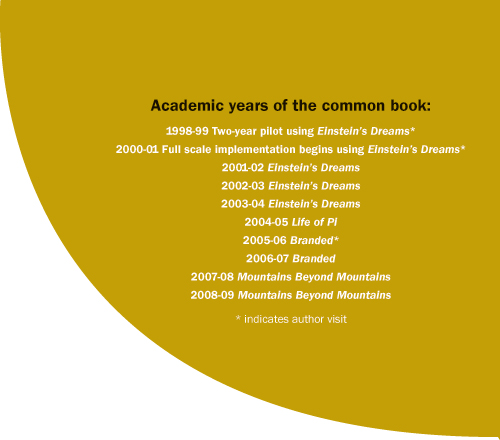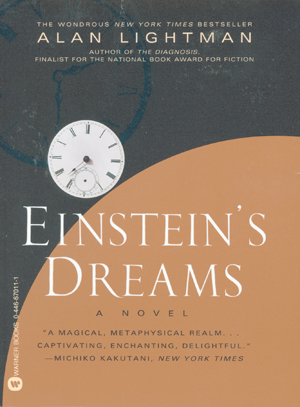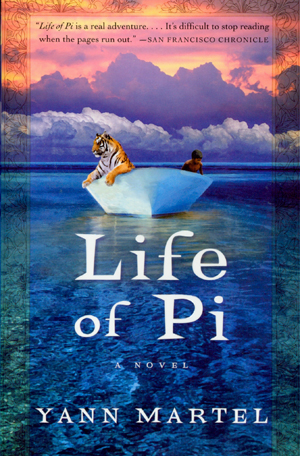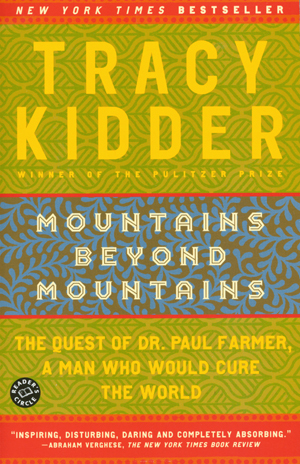 |
|
 by MEGHAN WILLIAMS |
|
|
 |
|
Common Book beginnings In 1998, Associate Provost for Undergraduate Education and Professor of Architecture Ron Daniel introduced the Common Book Project based on similar ventures at smaller, liberal arts universities. Initial support was secured from then-Provost Peggy Meszaros to begin a two-year Common Book pilot project. Daniel had previously used the book Einstein's Dreams by Alan Lightman in his first-year architecture design course, and he invited teachers of first-year students across campus to read the book and consider using it in their classes. "Their responses were lively and positive in various group conversations," Daniel says. "But even more importantly, their ideas illustrated both the challenges and opportunities of faculty members teaching first-year students." During the pilot project, more than 1,900 students, 22 professors, four colleges, and nine departments used Einstein's Dreams in their courses. Daniel also invited author Alan Lightman to campus to meet enthusiastic students, faculty members, and administrators who were intrigued by the book's creative depictions about concepts of time. The pilot cohorts were then surveyed about the value of the project, and the results encouraged Meszaros to support full-scale implementation. "The Common Book Project is an incredibly useful tool for professors to consider for first-year students," Meszaros says. "I stood behind this project a decade ago because of the intrinsic value of a common reading to bond incoming students intellectually in a common experience that stretches their thinking. The Common Book Project is just one more facet in Virginia Tech's outstanding undergraduate experience." A campus-wide committee was created to discuss programming options and to oversee the future of the project. The process of choosing subsequent books has varied. In some instances, "short lists" of books being considered were shared with faculty members across campus, and their feedback was used in making final decisions. At other times, student and faculty reading groups were utilized. Current Provost Mark McNamee has continued to strongly support the project. "The Common Book Project provides a wonderful way to engage thousands of students and faculty in a shared experience focused on discussions of a single book,” he says. "When I visited Virginia Tech for the first time in 2001, I was captivated by the first Common Book, Einstein's Dreams. There are so many ways to link the themes and issues in a carefully selected book to both the classroom and the extracurricular activities of our students." Four books have been distributed and read over the life of the project: Einstein's Dreams, by Alan Lightman; Life of Pi, by Yann Martel; Branded: The Buying and Selling of Teenagers, by Alissa Quart; and Mountains Beyond Mountains: The Quest of Dr. Paul Farmer, a Man who Would Cure the World, by Tracy Kidder, which was last year's and this year's book. The cost of purchasing books and some programming costs are provided through the generous support of the Virginia Tech Parent's Fund, which also supports other efforts dedicated to enhancing the undergraduate experience. |
||
 |
 |
 |
 |
|
The Common Book today Kidder's Pulitzer Prize-winning Mountains Beyond Mountains is an inspirational account of Dr. Paul Farmer's life as he traveled around the globe serving victims of poverty and disease. Part biography, part journalistic saga, it is a story of persistence and determination and a fascinating account of the global culture in which we live. One student called the selection of Mountains Beyond Mountains "a perfect book to demonstrate to students the impact they can make on others' lives." Assistant Provost for Liberal Education and Associate Professor of Theatre Arts Susanna Rinehart says, "Rarely does one story simultaneously encourage reflection on privilege while kindling the fire of intellectual curiosity. Mountains Beyond Mountains is a book that speaks to the student in all of us, and to the desire to listen, learn, and act. This book is an embodiment of Ut Prosim (That I May Serve)." Rinehart, in collaboration with Engineers Without Borders, is currently pursuing avenues to bring Dr. Farmer to campus in spring 2009. Where next? Two goals of the Common Book Project consistently have been to create communities of readers and to stimulate intellectual dialogue about ideas. Faculty members are encouraged to utilize concepts from the book in their classes, and informational pieces have been developed to illustrate the ways such readings might be used. Required first-year courses in the departments of English and communication often utilized the Common Book extensively. But the question remains, can a book really create community? While the jury is still out, it is known that many students and faculty members have created communities centered around a particular book. Daniel also notes that a university committee reviewing the Curriculum for Liberal Education (formerly the core curriculum) proposed the addition of an annual "Common Question." "Such a question could provide additional motivation for the kind of community and conversation that is at the heart of the project," Daniel explains. "I even imagine that one day we might consider a second common book for students, a gift offered when students cross the stage at graduation, one that would serve both as a bookend for the concept of community here and signify the beginning of a new community beyond Virginia Tech." McNamee will appoint a university committee this fall to make the selection of Virginia Tech's Common Book for 2009-10, as well as to identify a robust complementary programming agenda and a university-wide accompanying "common question/theme" that would facilitate additional discussion and interest in the next selection. Wherever the future takes it, the Common Book has clearly been a successful venture during the past decade, and it is being emulated by more universities across the country. It indeed crosses borders, bridging the world of Virginia Tech academic life to student life beyond the walls of the classroom. The Common Book Project continues to be an outstanding example of Virginia Tech's goal to educate the whole student. MEGHAN WILLIAMS is communications manager for the Division of Student Affairs. |
||||||||
|
|